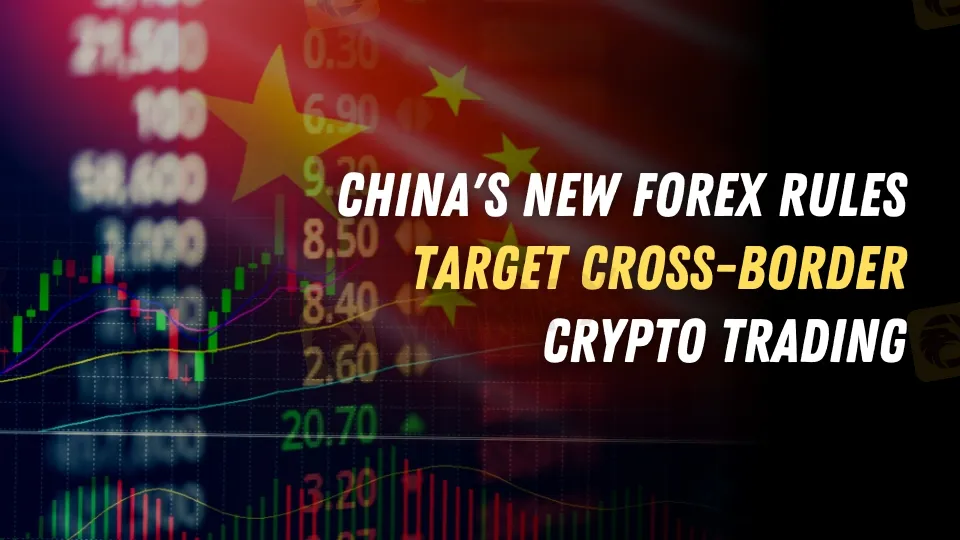简体中文
繁體中文
English
Pусский
日本語
ภาษาไทย
Tiếng Việt
Bahasa Indonesia
Español
हिन्दी
Filippiiniläinen
Français
Deutsch
Português
Türkçe
한국어
العربية
China's New Forex Rules Target Cross-Border Crypto Trading
Abstract:China's new forex rules tighten monitoring of cross-border crypto trades, requiring banks to track identities, fund sources, and trading frequencies.

China's new foreign exchange (FX) rules strengthen curbs on cross-border cryptocurrency trading in order to combat unlawful financial activity. These laws are yet another step in the country's continued efforts to impose its anti-crypto policy.
The Chinese foreign exchange regulator now compels banks to monitor and warn of potentially dangerous currency transactions, including those using cryptocurrencies. This includes cross-border gambling, underground banking, and other illegal financial transactions. Banks must now track the identities of individuals and institutions, as well as their funding sources and trade frequency.
According to a December 31 story by the South China Morning Post, new laws will make it more difficult for residents to own digital assets. According to Liu Zhengyao, a lawyer at ZhiHeng law firm, the regulations strengthen the legal basis for punishing crypto-related actions. He also pointed out that utilizing the yuan to buy cryptocurrency before converting it to foreign fiat currencies is now considered cross-border activity, making it practically difficult to avoid the limitations.
China has banned cryptocurrency trades since 2019. The government's main objectives were to reduce energy usage from cryptocurrency mining and to control greenhouse gas emissions. Financial institutions are also barred from conducting transactions involving digital assets or crypto-mining operations.
Despite its stringent policies, China remains the world's second-largest Bitcoin holder. According to Bitbo's Bitcoin Treasuries tracker, the government has roughly 194,000 BTC worth $18 billion. These holdings were acquired through asset seizures tied to illegal operations, as China's ban prohibits it from actively purchasing Bitcoin.

Number of countries holding Bitcoin. Source: BitcoinTreasuries.NET by Bitbo
Former Binance CEO Changpeng “CZ” Zhao claimed that China may someday adopt a Bitcoin reserve policy. Zhao stated at the Bitcoin MENA event in Abu Dhabi that if China chose to embrace Bitcoin, it may quickly adopt policies.
Final Thoughts:
China's new FX regulations highlight its commitment to regulating cross-border financial operations and curbing the usage of digital assets. These policies reflect the government's overarching purpose of ensuring financial stability and control. As the global cryptocurrency market evolves, the impact of China's policies on international markets and the future of cryptocurrencies will be crucial to monitor.

Disclaimer:
The views in this article only represent the author's personal views, and do not constitute investment advice on this platform. This platform does not guarantee the accuracy, completeness and timeliness of the information in the article, and will not be liable for any loss caused by the use of or reliance on the information in the article.
Read more

Are Trading Courses and Mentors a Fast Track or a Financial Trap?
In recent years, trading has become more popular than ever. Social media is full of people showing off their “trading lifestyle” with expensive cars, luxury holidays, and promises of easy money. Many of them claim to be mentors, investment coaches, or run online trading academies. They say they can turn beginners into full-time traders in just a few weeks. But is it true, or is it just a clever scam?

Gold Prices Pull Back, Near Four-Week Low Amid Easing Risk Sentiment
As risk aversion fades and investors turn their attention to U.S. inflation data, gold prices retreat sharply, falling to their lowest levels in nearly a month.

Using Any of These Illegal Forex Trading Apps? Stop Before It Turns into a Crisis
The Reserve Bank of India (RBI) has listed out some illegal forex apps India. Read this article to know some of those apps.

IC Markets Sponsors AEL Limassol, Football Club Until 2027
AEL Limassol has renewed its deal with IC Markets (EU) Ltd, who will stay as the team’s Gold Sponsor until 2027. The sponsorship deal was first announced for the 2025–2026 season, but it has now been officially extended until 2027.
WikiFX Broker
Latest News
PU Prime and AFA Announce Partnership at Madrid Event
ASIC Warns of Escalating Share Sale Scams Amid $119M Scam Losses
A Guide to RBI Forex Rules in India
“Wins with $19,916 weekly profit on Exnova”? There is something you should know.
Oil Prices Slide After Cease-Fire
IQ Option: Regulation, Warnings, and What Traders Need to Know
How Macro Events Drive Energy Price Fluctuations and Their Linked Impact on the Global Forex Market
Clones of ThinkMarkets Are Lurking | Don’t Fall for the Fake
Top 5 Forex Brokers Offering Islamic Accounts in 2025
Family offices double down on private credit and infrastructure during private equity slump, survey finds
Currency Calculator


